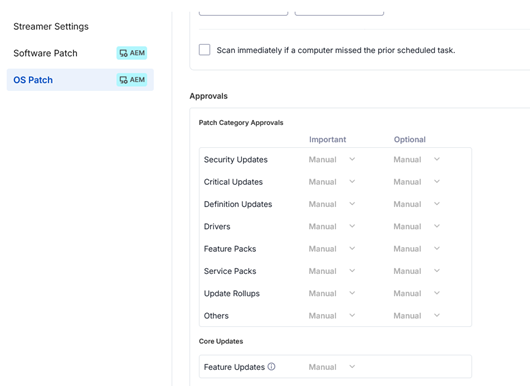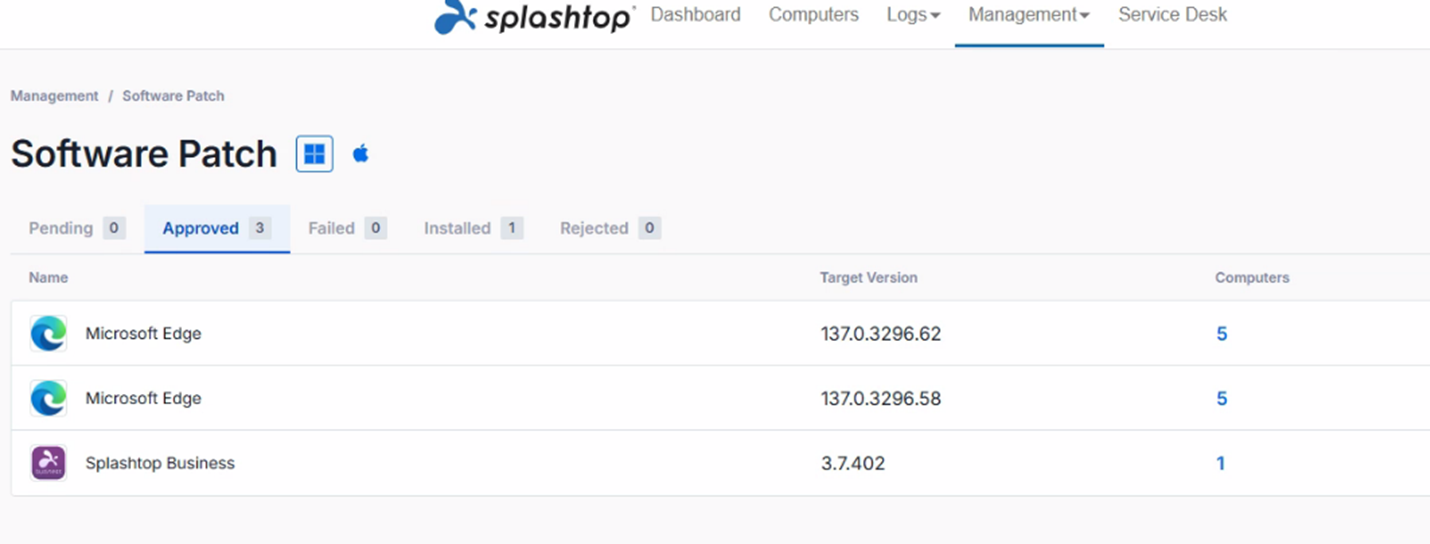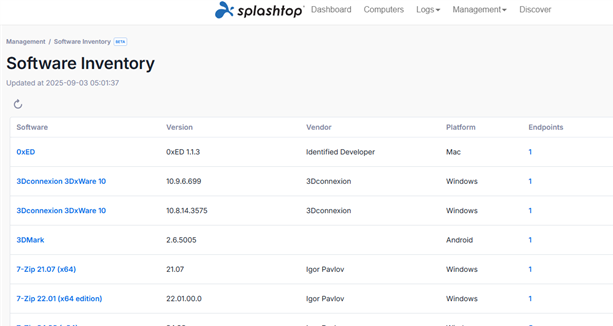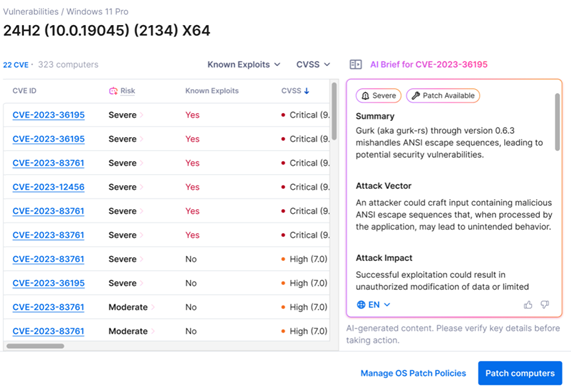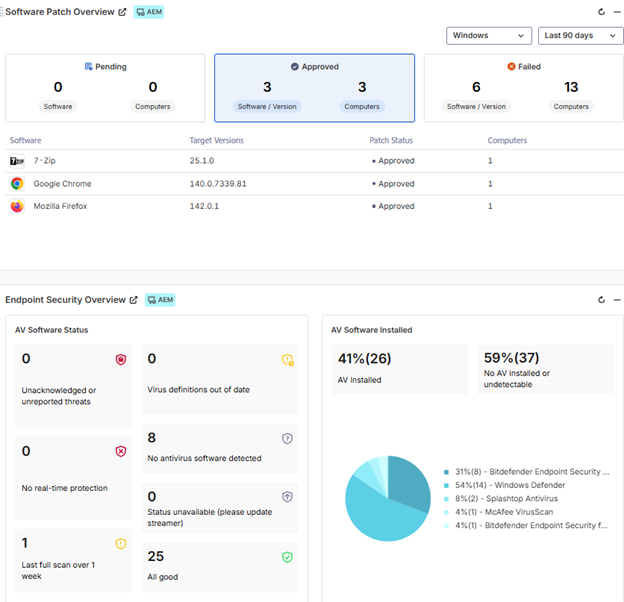The first half of the year has been all about helping IT teams reduce manual effort, improve endpoint visibility, and stay ahead of fast-moving security threats. At Splashtop, we’ve focused on expanding patch automation, strengthening vulnerability insights with AI, and making remote IT management more seamless across platforms.
These investments are being recognized in the industry: Splashtop was recently named a Representative Vendor in the Gartner® Market Guide for Endpoint Management Tools, underscoring our growing role in helping organizations simplify IT operations.
Here’s a look at the most impactful updates we’ve introduced so far this year.
Patch Management
We’ve made major strides in patch automation, helping IT teams strengthen compliance and reduce security gaps.
Windows Patch Policy Enhancements
We’ve introduced approval workflows and flexible scheduling to make Windows patching more reliable. For example, on Patch Tuesday, critical updates can be approved automatically while feature updates are held back for testing.![Splashtop patch management]()
With exportable logs, IT leaders gain visibility into patch status and can ensure even non-standard apps remain secure.
Windows Major Upgrade Support
IT can now manage major OS migrations, such as moving from Windows 10 to 11, directly through Splashtop policy management.Third-Party and Custom Software Patching
We’ve expanded our third-party patch catalog to cover more commonly used applications like web browsers (Google Chrome, Mozilla Firefox, Microsoft Edge), Zoom, Slack, Webex Teams, Dropbox, Foxit Reader, Adobe Acrobat Reader, and many more, reducing gaps in endpoint security. In addition, we’ve introduced support for hosting custom software packages, giving IT teams the flexibility to patch non-standard or internally developed apps within the same workflow as OS and third-party updates.![h1-2025-third-party-patch]()
macOS Patch Management Expansion
We’ve expanded patch automation to include macOS, giving admins the ability to view, trigger, and confirm updates from a single dashboard. This closes a key gap for teams supporting both Windows and macOS devices. To support this, we also introduced Credential Management to facilitate macOS updates, enabling smooth patch workflows today, with plans to expand its use to additional scripting automation soon.
Unified Inventory and Vulnerability Insights
We’ve added new ways for IT teams to gain visibility and act faster on identified risks.
Software Inventory
A new inventory page lets you see installed applications across all endpoints, with exportable reports for audits and upgrade planning.
For IT teams, this means when a critical vulnerability is announced, you don’t have to scramble, you can instantly search your environment, identify where the affected software is running, and act before attackers exploit it.![h1-2025-software-inventory]()
AI-Powered CVE Summaries
Dashboards now highlight which OS builds are exposed to vulnerabilities, with clear indicators for active exploits based on the CISA Known Exploited Vulnerabilities (KEV) catalog.
AI-generated summaries make it faster to assess risk and can even translate CVE details into multiple languages instantly, so global IT teams don’t have to wait for delayed local database updates.![h1-2025-ai-cve-summaries]()
Scripts and Tasks (formerly 1-to-Many)
We’ve enhanced Scripts and Tasks to support both online and offline devices in scheduled jobs. If a device is offline, tasks are automatically queued and executed once the endpoint comes back online. This ensures no system is missed, improving consistency and saving time across large environments.
Dashboard and Admin Controls
We’ve made it easier for IT teams to monitor and manage environments at a glance.
New Dashboard Widgets
Provides insights into patch automation results, endpoint security status, and deployment consistency.![h1-2025-dashboard-widgets]()
Account Expiration Controls
Enables Enterprise teams to automatically disable inactive users, enhancing compliance and mitigating risk.
Mobility and Device Management
We’ve introduced new features to help IT teams better support mobile and Android environments.
iOS File Transfer
Admins can now securely transfer files in and out of iOS devices during remote sessions, making it easier to support mobile workers without extra tools.Android Streamer Version Control
IT admins can set a maximum update version for the Android streamer, ensuring compatibility with existing apps and giving more control over rollout schedules.
Remote Support Enhancements
We’ve continued to build out Splashtop’s support capabilities, making it easier for IT teams to respond quickly and deliver a better experience.
Service Desk Chat
We’ve introduced in-session chat so technicians and users can communicate directly while a remote session is in progress, improving speed and clarity during troubleshooting.Service Desk Scheduling Improvements
New web form scheduling controls allow organizations to better manage incoming requests and align support sessions with team availability.SOS Enhancements
Organizations can now customize SOS download pages, creating a branded, professional experience for end users.
Looking Ahead
Splashtop continues to evolve with the same focus: helping IT teams work smarter, reduce risk, and simplify endpoint management across hybrid environments. These updates deliver immediate value by closing security gaps, automating manual work, and improving visibility where it matters most.
And we’re not stopping here; even more innovations are on the way in our next release cycle.
Check out our public roadmap to see what’s coming next.
Explore Splashtop Products
Discover how Splashtop helps IT teams save time, strengthen security posture, and streamline endpoint management. Learn more here.

